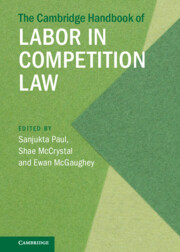Book contents
- The Cambridge Handbook of Labor in Competition Law
- The Cambridge Handbook of Labor in Competition Law
- Copyright page
- Contents
- Contributors
- Preface
- 1 Labor in Competition Law
- 2 Collective Labour Rights for Working People
- 3 Economic Coordination as Freedom of Association
- 4 The State’s Power to Govern in This Field Is Paramount: Antitrust, Labor, and the First Amendment
- 5 Competition Law as Collective Bargaining Law
- 6 Antitrust, Free Trade, and Fissuring
- 7 American Antitrust Exceptionalism
- 8 Competition and Labour Law in Canada
- 9 Workers and Competition Law in Japan
- 10 Workers and Competition Law in Australia
- 11 Workers and Competition Law in New Zealand
- 12 Competition Law and Labour Law
- 13 Workers and Competition Law in India
- 14 Competition and Labour Law in the United Kingdom
- 15 A Solution in Search of a Problem?
- 16 Competition and Labour Law in Germany
- 17 Labour Law and Competition Law Under French Regulation
- 18 Competition Law, Cartels and Collective Bargaining
- 19 The EU, Competition Law and Workers Rights
- 20 Is South American Collective Labor Law Confronted by Competition Law?
- 21 Conclusion
10 - Workers and Competition Law in Australia
The Public Benefits of Collective Bargaining
Published online by Cambridge University Press: 05 May 2022
- The Cambridge Handbook of Labor in Competition Law
- The Cambridge Handbook of Labor in Competition Law
- Copyright page
- Contents
- Contributors
- Preface
- 1 Labor in Competition Law
- 2 Collective Labour Rights for Working People
- 3 Economic Coordination as Freedom of Association
- 4 The State’s Power to Govern in This Field Is Paramount: Antitrust, Labor, and the First Amendment
- 5 Competition Law as Collective Bargaining Law
- 6 Antitrust, Free Trade, and Fissuring
- 7 American Antitrust Exceptionalism
- 8 Competition and Labour Law in Canada
- 9 Workers and Competition Law in Japan
- 10 Workers and Competition Law in Australia
- 11 Workers and Competition Law in New Zealand
- 12 Competition Law and Labour Law
- 13 Workers and Competition Law in India
- 14 Competition and Labour Law in the United Kingdom
- 15 A Solution in Search of a Problem?
- 16 Competition and Labour Law in Germany
- 17 Labour Law and Competition Law Under French Regulation
- 18 Competition Law, Cartels and Collective Bargaining
- 19 The EU, Competition Law and Workers Rights
- 20 Is South American Collective Labor Law Confronted by Competition Law?
- 21 Conclusion
Summary
In common with many developed world countries, the regulation of labour markets in Australia has been characterised by a divide between workers governed by labour laws (employees) and workers governed by commercial laws, including competition law and policy (everyone else). This divide has meant that access to collective bargaining and the right to strike has largely only been accessible by traditionally employed workers. However, for many decades, Australian competition regulation has included a mechanism to enable self-employed workers and other businesses to seek permission from the competition regulator to engage in collective activities. The express statutory basis for permitting proposed conduct has been on the basis that it will produce ‘net public benefit’ – ie, produce more positive outcomes than harmful ones. In 2021, in recognition of the widespread public benefit that can be gained from collective action, the need for prior permission was removed, and a class exemption for small business collective bargaining was declared. This chapter examines the Australian competition law regime, and the regulation of workers and small businesses, with particular attention to the development and operation of the ‘public benefit’ exemption for collective bargaining.
Keywords
- Type
- Chapter
- Information
- The Cambridge Handbook of Labor in Competition Law , pp. 154 - 168Publisher: Cambridge University PressPrint publication year: 2022



